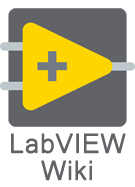Getting Started: Difference between revisions
Appearance
No edit summary |
Added link to niconnect page |
||
| (20 intermediate revisions by 4 users not shown) | |||
| Line 1: | Line 1: | ||
__NoTOC__ | |||
{| class="wikitable" style="width:100%;" | |||
|- style="background-color:#616366; font-size:200%; border:none; margin:0; padding:.3em; color:#FFD500; text-align:center;" | |||
| '''Getting Started Portal''' | |||
|- | |||
| This '''Getting Started''' page is intended to be a starting point and resource to help navigate all LabVIEW content on this Wiki and elsewhere. It came into existence after a group of LabVIEW Community members decided that a central beginning point was needed to point new G programmers to. | |||
|} | |||
* | {| class="wikitable" style="width:100%;" | ||
**[[ | |- style="background-color:#616366; border:none; color:#FFD500; text-align:center;" | ||
**[[LabVIEW_style_guide|LabVIEW Style Guide]] | | '''Subcategories''' | ||
**[[Community|Online Community]] | | colspan=2 |'''Topics in Getting Started''' | ||
|- style="vertical-align:top;" | |||
| style="width:20%; text-align:top; background-color:#EFEFEF;" | <center><small>Select [►] to view subcategories</small></center> | |||
<categorytree mode="Pages" showcount="off" depth="1">Skill Level</categorytree> | |||
| style="width:40%;" | | |||
== Fundamentals == | |||
This section covers topics and supplemental information for the LabVIEW Core 1 training course. These topics are aimed at new users. | |||
=== Environment === | |||
* [[LabVIEW]] ([[LabVIEW FAQ|FAQ]]) | |||
* [[Virtual Instrument|Virtual Instrument (VI)]] | |||
** [[Front Panel]] | |||
** [[Block Diagram]] | |||
** [[Connector Pane]] | |||
** [[VI Icon]] | |||
*[[data flow|Data Flow]] | |||
=== Data Types === | |||
* [[Boolean data type]] | |||
* [[Integer data type]] | |||
* [[String data type]] | |||
=== Structures === | |||
* [[While Loop structure|While Loop]] | |||
* [[For Loop structure|For Loop]] | |||
* [[Case structure|Case Structure]] | |||
=== Tools=== | |||
* [[Debugging]] | |||
=== Design patterns === | |||
* [[State Machine]] | |||
== Intermediate Topics == | |||
This section covers topics and supplemental information for the LabVIEW Core 2+3 training course. These topics are aimed at users who are familiar with LabVIEW fundamentals. | |||
=== Environment === | |||
* [[LabVIEW Project|LabVIEW Project ''(*.lvproj)'']] | |||
* [[LabVIEW Project Library|LabVIEW Project Library ''(*.lvlib)'']] | |||
* [[Application Builder]] | |||
* [[Run-Time Engine]] | |||
=== Data types === | |||
* [[Array data type]] | |||
* [[Cluster data type]] | |||
=== Structures === | |||
* [[Event structure|Event Structure]] | |||
=== Design patterns === | |||
* [[Event Handler]] | |||
* [[Producer/Consumer]] | |||
* [[Queued Message Handler]] | |||
* [[Functional global variable]] | |||
* [[Error_handling|Error Handling]] | |||
| style="width:40%;" | | |||
== Advanced Topics == | |||
This section covers information for advanced LabVIEW topics. These topics are aimed at experienced users who are familiar with the core concepts of LabVIEW. | |||
* [[Object-oriented programming]] | |||
* [[VI Server]] | |||
== Expert Topics == | |||
This section covers topics for expert LabVIEW users with experience in programming medium to large-scale applications in LabVIEW. | |||
* [[VI Scripting]] | |||
* [[Actor Framework]] | |||
* [[XControl]] | |||
== Software Engineering Processes == | |||
* [[Source_code_control|Source Code Control]] | |||
* [[Unit_testing|Unit Testing]] | |||
* [[VI Analyzer|VI Analyzer (Static Code Analysis)]] | |||
* [[SOLID Principles]] | |||
== Additional Learning Resources == | |||
*[[LabVIEW_style_guide|LabVIEW Style Guide]] | |||
*[[Text-Based terminology|Text-Based terminology to G terminology]] | |||
*[[Training|Online Training]] | |||
**[[LabVIEW tutorial|LabVIEW Tutorials]] | |||
*[[Community|Online Community]] | |||
**[[LabVIEW_blogs|LabVIEW Blogs]] | |||
**[[LabVIEW Community Managed Discord Servers|LabVIEW Discord Servers]] | |||
**[[List of LabVIEW-related Twitter accounts|LabVIEW Related X (Twitter) Accounts]] | |||
**[[LabVIEW Books|LabVIEW books]] | |||
**[[Online_videos|Online Videos]] | |||
**[[Contributing_online|Contributing Online]] | **[[Contributing_online|Contributing Online]] | ||
**[[Community Tools and Libraries]] | |||
**[[Events]] (Connecting With Other Developers) | |||
***[[User Groups]] | |||
***[[NI Connect]] | |||
***[[NIWeek]] | |||
***[[GDevCon|GDevCon]] | |||
***[[CLA Summit|CLA Summits]] | |||
**[[Finding_professional_help|Finding Professional Help]] | **[[Finding_professional_help|Finding Professional Help]] | ||
|} | |||
[[Category: | [[Category:Portals]] | ||
Latest revision as of 09:49, 6 January 2025
| Getting Started Portal |
| This Getting Started page is intended to be a starting point and resource to help navigate all LabVIEW content on this Wiki and elsewhere. It came into existence after a group of LabVIEW Community members decided that a central beginning point was needed to point new G programmers to. |
| Subcategories | Topics in Getting Started | |
FundamentalsThis section covers topics and supplemental information for the LabVIEW Core 1 training course. These topics are aimed at new users. EnvironmentData TypesStructuresToolsDesign patternsIntermediate TopicsThis section covers topics and supplemental information for the LabVIEW Core 2+3 training course. These topics are aimed at users who are familiar with LabVIEW fundamentals. EnvironmentData typesStructuresDesign patterns |
Advanced TopicsThis section covers information for advanced LabVIEW topics. These topics are aimed at experienced users who are familiar with the core concepts of LabVIEW. Expert TopicsThis section covers topics for expert LabVIEW users with experience in programming medium to large-scale applications in LabVIEW. Software Engineering ProcessesAdditional Learning Resources | |
